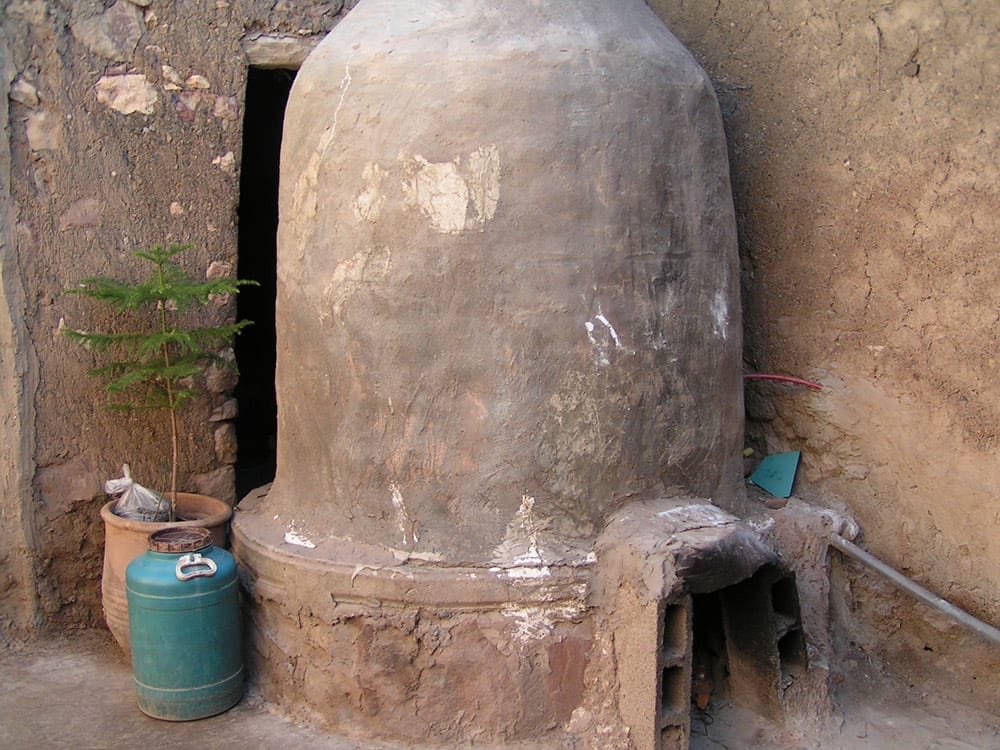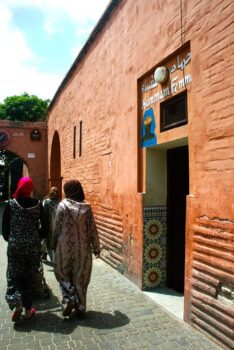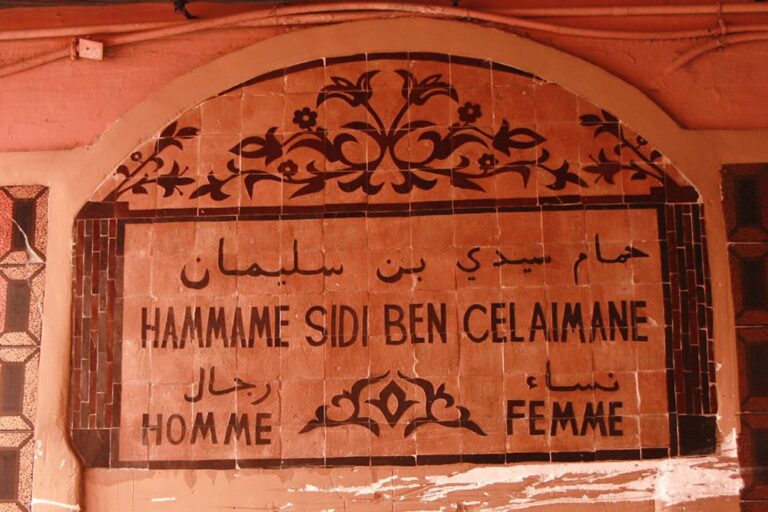Further to Abdou’s comment, the end of which was rather mocking,
1 woman in 10 in France, for example, visits a beauty salon. Moroccan women don’t have all that. She has at least one SPA a week (Hammam BELDI).
I decided to explain to you why ‘the’ Moroccan woman goes to the hammam every week, and for once I’m going to tell you about my family-in-law.
My husband is Berber, from the edge of the Draa Valley. His father is 82 years old, he’s never been to school, he can’t read, but he can count enough to run his little shop.
It’s a poor family. When he was young, my father-in-law used to cross the border to rent out his hand to Algerian settlers. He worked as a farm labourer for the others, and those who know Morocco will know what that means; he became a tailor and opened a small garage.
This is not one of the poorest families. They do have some land, which used to be a pretty farm in henna, before the great drought that started about fifteen years ago. The farm was abandoned, and it was to revive it that we created our berber camping place. The eldest son, who took over his father’s garage, must have an annual income of around €3,200, which is around 10% more than the relative poverty line in rural areas, and that’s enough to support a family of 8. He gets by because two of his sons work with him in the garage, bringing in a total of 2,000 euros more, but when they get married in a few years’ time, it will become difficult.
My mother-in-law was already a widow with a daughter when she married my father-in-law. They had 9 children.

With the exception of the eldest, who really didn’t like studying, all 7 boys went on to take the baccalauréat (the girls, who were also in the eldest family, didn’t go on to study, as schooling for girls only became the norm in Tazzarine about twenty years ago).
The eldest has taken over the garage, the second is a headmaster at a secondary school, the third a teacher, also at a secondary school. Another is a gendarmerie officer, one is a specialist air conditioning technician in France, the youngest is a grand taxi driver, and the penultimate is my husband.
In the third generation, of the four nephews and nieces who have passed the baccalaureate, three are studying or have studied at university level. The next one, a girl from Tazzarine, will stop after her baccalaureate this year, but her fiancé, with whom she got engaged last year, wanted to postpone the wedding until she had finished her studies.
This is also what happened to one of my nieces, who waited almost two years between her engagement and her wedding to finish her degree.
In my husband’s generation, marriages were arranged. There were failures, and a few divorces, but the majority were successful. In the next generation, it seems that the old Berber tradition, where the boy asks the girl for her opinion before having the marriage arranged by the parents, is making a comeback.
I have, however, attended a wedding where the bride and groom discovered each other in the bridal bedroom. And so far, it’s a happy marriage.
All that to say that this is a normal family from rural Morocco, rather liberal (otherwise they wouldn’t have welcomed me so warmly), and with a fairly wide ‘socio-professional’ range.
I often use them as a reference when discussing living conditions in a Morocco that is not the country of the privileged or the big cities, but that of the famous middle class that is emerging.
So why do the women in the family go to the hammam every week?

Until three years ago, only two families had hot water at home, the teacher’s and the gendarme’s (government premises… although his last posting was Figuig, so water, hot or cold, is hard to come by). And of course the families who immigrated to Europe, but that’s another story.
Before we had our own house, we regularly squatted in the house of the lycée headmaster in Ouarzazate. There weren’t even any taps for hot water, and we used to heat our water in the kettle, on the little gas stove next to the bath, to mix it with the big buckets of cold water.
He has now moved to a state-provided staff house within the school grounds, a fairly large house with a garden and 7 large rooms, and there is still only one tap for the cold water. Hot water attracts the jinn…
As for Tazzarine, there are only two showers in the douar for 16 permanent residents. The water heaters were installed three years ago, when the only hammam in Tazzarine was closed. There was a large crack in the wall, which has still not been repaired, so not a single woman from Tazzarine goes to the hammam.
Personally, I’m one of those French women who don’t go to beauty salons, by choice, because I’ve got lots of more fulfilling things to do in my free time than to go and chat in a salon full of chicks, my face covered in weird stuff that they sell me for 10 times what it’s worth… but I also know that for the women in my family, having the opportunity to go to the hammam only when they feel like it, and not out of some hygienic obligation, once a week, is seen as a liberation.
“The” Moroccan woman?
It’s very difficult for me to talk about “the” Moroccan woman. I come into contact with at least three of them: the rural woman, the traditional woman who lives in town, and the modern woman (no need to specify that she lives in town). And each of the three is on a totally different planet.
For these three women, the hammam represents something different. A hygienic obligation for the rural woman and the traditional woman, a moment of relaxation for the modern woman.
For all three, it’s also a special time when women can talk to each other, enjoy a time when all they have to do is wash and keep an eye on their young children, and gossip endlessly.
 A typo or syntax error? You can select the text and hit Ctrl+Enter to send us a message. Thank you! If this post interested you, maybe you can also leave a comment. We'd love to exchange with you !
A typo or syntax error? You can select the text and hit Ctrl+Enter to send us a message. Thank you! If this post interested you, maybe you can also leave a comment. We'd love to exchange with you !




